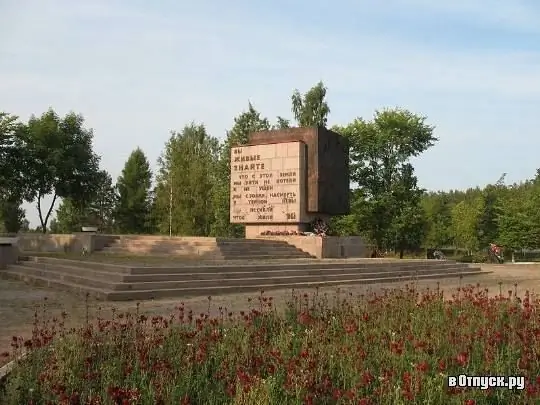
Description of the attraction
During the Great Patriotic War, on the left bank of the Neva River, between the village of Pavlovo and the city of Kirovsk, on a tiny piece of land, later called "Nevsky Piglet", bloody battles between Soviet troops and Nazi invaders took place. Indeed, the size of this key foothold is small - 800 m from the coastline and 2 km along the river. According to the calculations of historians, in one day, 52 thousand shells and bombs were dropped on this piece of land.
From the east, the Nevsky Pyatachok memorial is limited by a 76-millimeter gun mounted on a pedestal. From the south - the so-called Rubizhnoe stone, which represents uneven granite and cast-iron cubes intersecting with each other (project by OS Romanov, E. Kh. Nasibulin, M. L. Khidekel). One of the cubes of the structure has a high relief depicting warriors. At the place where the troops landed on September 20, 1941, there is now a granite stele. Before the start of the war, the village of Arbuzovo was on the site of the "Nevsky Piglet".
This place is a memory of one of the most tragic pages in the history of the Great Patriotic War. On this small beachhead, bloody battles between Soviet and German troops took place, which for 400 days tried to break the blockade of Leningrad on this tiny sector of the front. On the night of September 19-20, 1941, the soldiers of the Leningrad Front crossed the Neva and were able to consolidate their positions near Nevskaya Dubrovka. All attempts to advance further have not been crowned with success. The battles on the "Nevsky Pyatachka" went on until April 29, 1942. Our troops were forced to surrender their positions and were able to re-seize the bridgehead on September 26. The fighting did not stop for a moment.
According to historical and archival documents, the losses of the Red Army in this sector of the front amounted to several hundred tens of thousands. In 1960, in one of the publications of Pravda, the figure was 200 thousand. At the beginning of the new millennium, the Committee of Leningrad Veterans revised the data, and the figure was 50 thousand. The losses of the Germans are estimated at 35-40 thousand. Until now, the remains of soldiers of the Red Army and the Wehrmacht are found here every year.
There is an established opinion that on the "Nevsky Piglet", on each of its square meters, from 6 to 100 of our soldiers died. These data have been published in the media more than once, historians refer to them. The historian V. Beshanov in his book "Leningrad Defense" says that on each meter of "Nevsky Piglet" 17 people laid their heads. A total of 250 thousand soldiers and officers of the Soviet Army. In the documentary film "Leningrad Front" veteran I. Krasnopeev says that for every meter there were 10 dead soldiers, and our losses amounted to 100 thousand. But it is incorrect to speak or try to make any calculations based on the size of the bridgehead or the number of participants in the battles, given that the area of the combat bridgehead has changed.
Nowadays, the Nevsky Pyatachok memorial is one of the many places on the heroic Leningrad land, where mourning ceremonies and celebrations dedicated to the Great Patriotic War are held annually.
Memorial "Nevsky Piglet" is part of the Green Belt of Glory.






